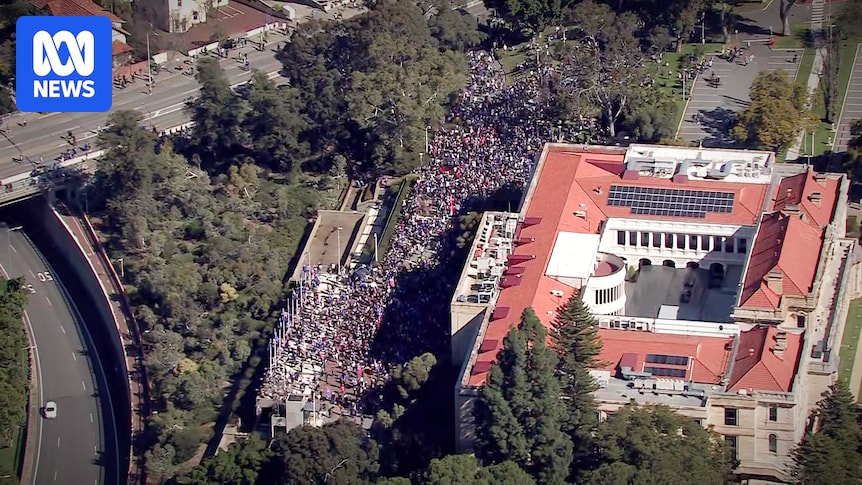
Members of a neo-Nazi group who chanted “heil Australia” at an anti-immigration rally in Perth over the weekend did not violate Western Australia’s hate laws, according to WA Police. The rally, part of the nationwide “March for Australia” events held on Sunday, has sparked widespread concern over the tactics employed by far-right groups to engage the public in immigration debates.
Footage from the Perth rally, which was the last to commence across the nation, showed neo-Nazi participants vocalizing their disturbing chants among a crowd of approximately 5,000 people. One Nation MP Rod Caddies, who spoke at the event, stated that neo-Nazis were not welcome at the rally. Despite the unsettling nature of the chants, WA Police confirmed that the language used did not constitute an offense under current legislation, though they condemned any behavior promoting hate or racism.
Legal Framework and Police Response
Under Western Australian law, displaying Nazi hate symbols and performing a Nazi salute publicly are criminal offenses, following reforms enacted late last year. These offenses carry severe penalties, including up to five years in prison or a $24,000 fine upon summary conviction. Despite this, the chants at the rally did not meet the threshold for criminal conduct as defined by the law.
WA Police emphasized their commitment to monitoring individuals and groups that pose a risk to public safety, with intervention promised if actions are deemed criminal. In connection with the Perth rally, three individuals were charged with various offenses. An 18-year-old woman was allegedly found carrying an edged weapon, and a 39-year-old man was accused of obstructing a public officer. Both are scheduled to appear in court later this month. Additionally, a 19-year-old man received a court summons for possessing an edged weapon.
Public Reaction and Political Condemnation
The rally’s atmosphere outside Parliament House was tense, with organizers attempting to silence a man dressed in black who used a megaphone adorned with symbols. This individual led the “heil Australia” chant, which was echoed by similarly dressed men in the crowd. A woman confronted the group, expressing her disgust and questioning their motivations.
WA Premier Roger Cook condemned the presence of neo-Nazis at the rally, describing the event as a “disgrace” and accusing participants of promoting division and hatred. “These people are just simply trying to demonize people in the community as part of some sort of campaign of division and hatred,” he stated. Cook urged those who found themselves aligned with the neo-Nazi movement to reconsider their stance.
“If your cause aligns with the neo-Nazi movement, you know you’re on the wrong track, stop it,” Cook said. “Stop trying to demonize people in our community and particular groups in our community because that only breeds further hatred, it breeds division, and it breeds racism.”
Opposition and Expert Opinions
WA Opposition leader Basil Zempilas, himself the son of a migrant, called for sensible migration policies while criticizing the behavior at the rallies. “Some of the images that we saw yesterday were not respectful of the community that were around them and, in some cases, did not follow the laws of the land and that’s never acceptable,” he remarked.
Zempilas supported police investigations into any footage of the rally, emphasizing that no one should feel unsafe or threatened by hate speech. “I welcome that because nobody should feel unsafe, nobody should feel threatened and groups that preach some form of hate speak should never be encouraged or welcomed when gathering amongst the population of Western Australia,” he added.
Implications and Future Considerations
The events in Perth highlight a growing concern about the mobilization tactics of far-right groups in Australia. Experts warn that such rallies, under the guise of anti-immigration sentiment, serve as platforms for spreading extremist ideologies. The legal loopholes that allowed the chants to go unpunished may prompt calls for further legislative reforms to curb hate speech more effectively.
As the nation grapples with these challenges, the need for a nuanced approach to immigration and community cohesion becomes ever more pressing. The public and political leaders alike must navigate the fine line between freedom of speech and the protection of vulnerable communities from hate and discrimination.






